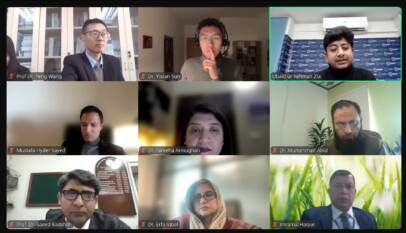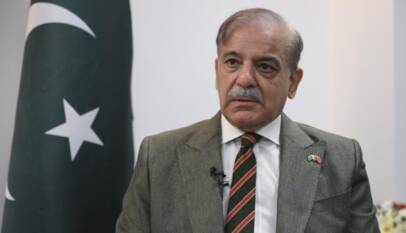China fully supporting Pakistan to revamp Agriculture Sector
Government is working to include agriculture cooperation in CPEC framework. In October 2019, Pak-China Agriculture Cooperation Exchange Centre was established in Islamabad during the Pak-China Agricultural Cooperation Forum. President of Pakistan, Arif Alvi and Chinese Ambassador Yao Jing inaugurated the centre. With regards to the forum, Chinese firms would provide assistance to find a sustainable solution for Pakistan’s agricultural obstacles. China pledged to open up its markets for Pakistani agriculture products like rice, fish, facilitate Pakistan in the marketing of its Halal food products, also to provide modern agricultural technologies. Moreover, in September 2019, China also approved technical assistance for 13 mega agriculture sector projects under CPEC.
KARACHI: The Pakistan Tehreek-e-Insaf (PTI) government is striving to lift agricultural growth in the country but its policies reflect little understanding of the basic paradigm of agricultural development.
Agriculture being a provincial subject is supposed to be handled with political wisdom and not with political naivety or political expediency. So far, the PTI’s political naivety and political expediency have dictated agricultural policies, making them least effective.
Now, Prime Minister Imran Khan is promising once again to revitalise agricultural growth with the help of global institutions like the Asian Development Bank (ADB). He is also relying on the agricultural cooperation framework of the China-Pakistan Economic Corridor (CPEC), details of which are yet to be made public.
In December 2019, ADB’s Chief for Rural Development and Food Security Dr Akmal Siddiq met the prime minister and both discussed in detail how Pakistan’s agriculture sector can be revitalised.
The ADB official told PM Imran that his institution had plans to introduce corporate agriculture on a wider scale in Balochistan. He also said the ADB had approved a $1-million grant for promoting the use of information technology in Pakistan’s agriculture and the project would commence in 2020.
In November, the ADB had approved a $275-million loan for an irrigation project in Punjab aimed at boosting crops growth by 50% and benefiting 200,000 farmers of Jhelum and Khushab districts.
Prior to that, in October 2019, the ADB had announced that between 2020 and 2022 it would be lending an average of $2.4 billion a year to Pakistan, up from $1.4 billion a year in the past.
Part of the increased financing would cover projects in the agriculture sector. Already, the ADB-financed or co-financed projects cover crucial areas of Pakistan’s agriculture like irrigation, water resources, agricultural marketing development, etc.
Towards the end of October 2019, President Arif Alvi and Chinese Ambassador to Pakistan Yao Jing inaugurated the Pak-China Agriculture Cooperation Exchange Centre in Islamabad under the Pak-China Agricultural Cooperation Forum.
The forum has been created to help Pakistan benefit from Chinese experience in the agriculture sector. Chinese companies will help Pakistan find out sustainable solutions to key agricultural problems like low yield of crops and livestock, pre- and post-harvest wastage and poor marketing.
In addition to opening up its own market for Pakistani agricultural products like rice and fish, China has also promised to assist Pakistan in the acquisition of modern agricultural technologies and in marketing of its Halal food products across the region.
In November, the ADB approved a $2.5-million grant in technical assistance for the adoption of modern technology to boost productivity of agriculture sector in Punjab. Under this project, farmers’ access to technology will be enhanced for better harvesting of crops, post-harvest management and direct marketing of the farm produce.
Earlier, in September last year, China agreed to provide technical assistance for 13 mega projects of Pakistan’s agriculture sector. These include setting up mega storage facilities and designated processing zones for different crops across Pakistan and setting up a large-scale dairy farming and processing unit in Khyber-Pakhtunkhwa as a Pakistan-China joint venture.
These are in addition to several other projects in the area of agriculture and livestock research, production of small agricultural machinery, development of disease-resistant seed varieties of various crops, etc.
Stumbling blocks
Pakistan’s agriculture sector suffers from a host of constraints. These include low spending on research, lack of certified seeds, low yields of crops, broken supply chain, shallow value-addition base, scarcity of irrigation water and skilled farm labour, rudimentary farm practices, improper, insufficient grain storage facilities, high post-harvest losses, lack of marketing infrastructure, ever-rising cost of inputs, insufficient access to information regarding price discovery and a lack of access to formal finance.
The ADB’s help has always proved crucial in supporting Pakistan’s agriculture and one can hope that Chinese help would also be meaningful.
However, implementation of the identified projects with the technical and financial assistance of the ADB and China would require ideal coordination between the federal and provincial governments.
A key question is whether this cooperation could be forthcoming? Secondly, in seeking Chinese help in the agriculture sector, the underlying objective is to boost agricultural exports to China and other Asian countries.
Meeting this objective will, however, require a real transfer of technology from China to Pakistan and speedy removal of tariff and non-tariff barriers to exports to Chinese markets.
Have we secured any solid guarantees in this regard? If yes, what we have promised in exchange? These are important issues that require open public debate.
Another important issue that needs to be debated in the context of agricultural revival plan is Pakistan’s high population growth rate. Sadly, the PTI government keeps harping on agricultural growth and food security, leaving the other key issue of population growth untouched.
Experts highlight green SEZs under CPEC for sustainable development
ISLAMABAD – The experts on Monday emphasised the significance of enhanced collabor…












